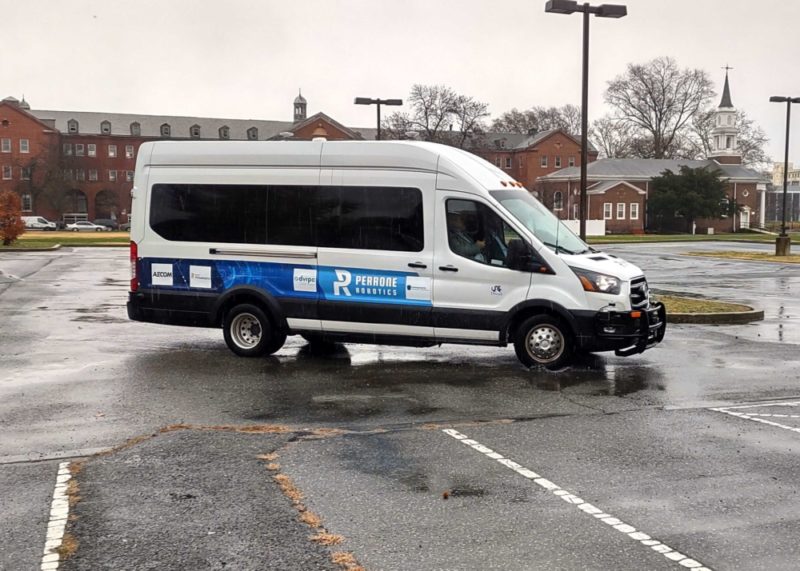That ride through the South Philly mixed-use campus — once the hub of another then-innovative form of transportation — could come just a few months from now: Philadelphia Industrial Development Corporation (PIDC) said this week that its autonomous vehicle shuttle project started testing and training this month.
The project is a collaboration between PIDC, Pennsylvania Department of Transportation (PennDOT), AECOM, Perrone Robotics, Delaware Valley Regional Planning Commission (DVRPC), Drexel University’s Department of Mechanical Engineering and Mechanics and the City of Philadelphia.
The project is funded by a grant from DVRPC’s Travel Options Program. In February 2022, the Navy Yard announced that Charlottesville, Virginia-based Perrone Robotics won the contract to supply the shuttle for the project.
Jacob Dillon, director of Navy Yard marketing and communications, told Technical.ly this project was initially delayed due to supply chain issues, but has been a long time coming.
The Navy Yard is now working on testing, mapping routes, training drivers to operate the AV technology, and analyzing data to improve routes and shuttle performance, Dillon said. If everything goes smoothly, this initial phase is anticipated to end in early spring 2023. In the next phase — officially referred to as Phase I — the autonomous shuttle will transport passengers between locations within the Navy Yard. A later Phase 2 will see the shuttle transporting passengers between the Navy Yard and NRG Station, the nearest Broad Street Line subway stop. Dillon said the full timeline of these phases depends on successful testing.
Mark Kopko, director of transformational technology at PennDOT, said that for the foreseeable future, the shuttle will have a human operator — though its launch does comes just after Gov. Tom Wolf signed AV legislation HB 2398 into law, allowing autonomous vehicles to be tested on Pennsylvania roads without a licensed human driver.
“The automated driving system will be performing all the dynamic driving tasks,” he said Friday afternoon. The human operator “is just there as an adequate level of redundancy especially since you have passengers on board.”
According to the Navy Yard, this is Pennsylvania’s first AV shuttle project. Other forms of autonomous vehicle testing and development have long been happening in Western PA’s Pittsburgh, dubbed the “robotics capital of the world” by stakeholders there.
Dillon said this shuttle will expand transit options in the Navy Yard, “improving what we already have and being forward thinking on how we operate in the future.” The shuttle itself is a completely electric TONY-MEV, aka medium electric transit vehicle, that can fit nine passengers and a wheelchair, along with the operator.
Kopko said this project is an opportunity to expose Philadelphians to autonomous technology. There are mobility and research and development benefits, too: “It’s just a way that we can get the best of both worlds here lining up, where we can continue to grow technology as safely as possible while at the same time addressing existing needs.”
According to Dillon, the Navy Yard has hosted many other innovative projects over the years, and this is the next phase of that work.
“AVs are the future of clean, sustainable travel. And as we embark on our new 20-year development plan where $6 [billion] will be invested in equitable growth, we must embrace new technologies that will allow us to do that in sustainable and resilient ways,” he said via email. “The Navy Yard is excited to be part of a pilot program that will hopefully serve as an example of how AV shuttles can be used in other areas of the city and across the commonwealth.”
Sarah Huffman is a 2022-2024 corps member for Report for America, an initiative of The Groundtruth Project that pairs young journalists with local newsrooms. This position is supported by the Lenfest Institute for Journalism.Join the conversation!
Find news, events, jobs and people who share your interests on Technical.ly's open community Slack

Delaware daily roundup: Delmarva Power vendor stats; DelDOT's $15M federal grant; 50 best companies to work for

Delaware daily roundup: Over 4,000 Black-owned businesses uncovered; Dover makes rising cities list; a push for online sports betting

Philly daily roundup: East Market coworking; Temple's $2.5M engineering donation; WITS spring summit


